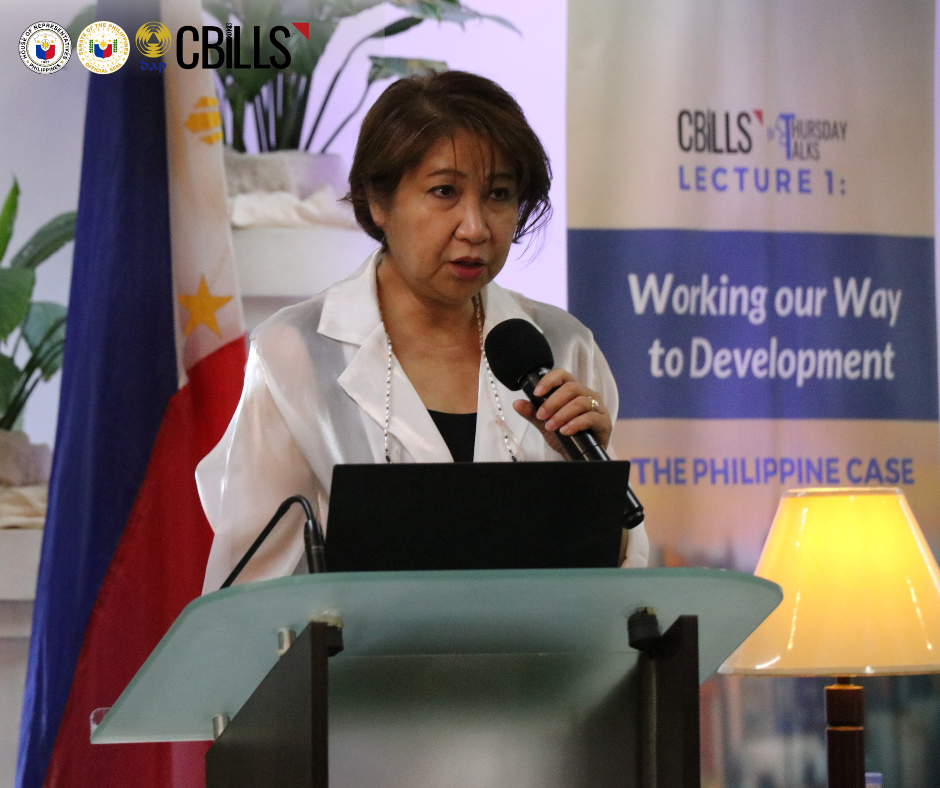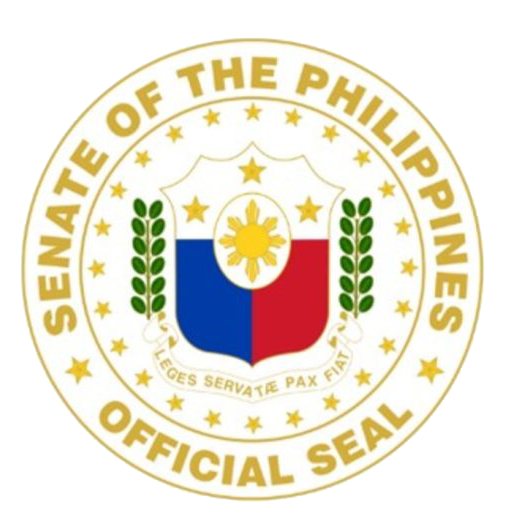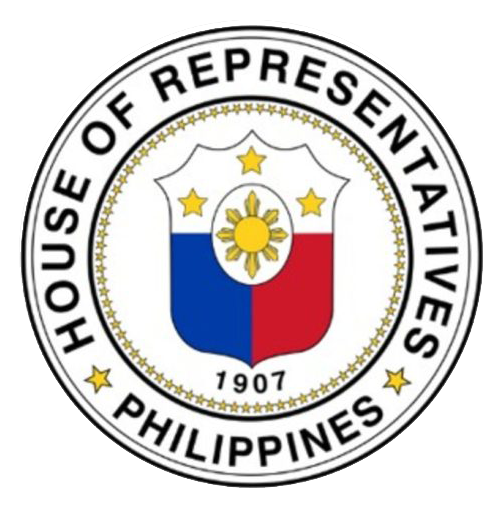DAP TACKLES PHILIPPINE DEVELOPMENT POLICIES IN 2023 CBILLS TALK

Photo session of the participants together with the invited resource speakers and special guest for the CBILLS 2023 Thursday Talks Lecture 1
at the Development Academy of the Philippines
18 May 2023 – The Development Academy of the Philippines (DAP), through its Center for Governance – Policy Research Office, conducted the first installment of the Thursday Talks Lecture Series under the Capability Building on Innovative Leadership for Legislative Staff (CBILLS) program entitled, “Working our Way to Development: The Philippine Case” at the Development Academy of the Philippines in Ortigas Center, Pasig City.
Ms. Sheena Carmina Mateo, Program Manager of the CBILLS Program, welcomed the participants and provided a brief history of the CBILLS Thursday Talks Lecture Series component, including its past themes and how each year’s edition contributed to the discussion of emerging national issues. Ms. Mateo then talked about this year’s theme, “Rethinking Transformative Development Policies for an Inclusive and Resilient Philippines,” which emphasizes the role of retrospection when assessing past development policies and programs. She highlighted how this cognizance of the past could be the foundation of a more diagnostic strategy to evaluate the opportunities and difficulties encountered by the country. In return, these learnings may serve as guideposts to craft better, more appropriate, and more responsive reforms and actions in the public sector.
Ms. Jamie Lyn Daileg, the Senate Committee Secretary on Economic Affairs, introduced the lecture topic which provided an overview of the Philippines’ development experience that may have influenced the country’s current development strategy and policies. She mentioned that the lecture aims to identify actors in society that have shaped the nation’s current economic standing in the region and the world. The lecture also aims to explore prospective areas for public policy assessment and reform to better address socioeconomic and environmental problems.

UP School of Economics Professorial Lecturer,
Dr. Emmanuel F. Esguerra
For the first session, Dr. Emmanuel F. Esguerra, a Professorial Lecturer from the UP School of Economics, discussed the economic growth and productivity of the Philippines and its neighboring countries. He presented a chart that compared the Philippine GDP growth and productivity rate to countries that share the same characteristics as the Philippines, including ASEAN countries. He shared that the Philippine GDP growth improved during the late 1990s to early 2000s, but labor productivity was below the average compared with its regional peers. He also stated that, over the past two decades, the Philippines was left behind by its neighbors.
Dr. Esguerra also discussed the drivers of labor productivity growth, such as exposure to the international market and changes across sectors from low to high productivity. He suggested that the government needs to attract or invest in the fundamentals, directly targeting new industries for development. He also discussed how the country shifted resources from low-productivity to high-productivity sectors, allowing a nationwide development in the country. He warned that, in some cases, structural change can also reduce economic growth in countries with comparative advantage in natural resources due to globalization. This is the case for the Philippines, where labor productivity grew but not as much as other countries.
Dr. Esguerra then discussed the decomposition of labor productivity in the Philippines, emphasizing the failure of the country to follow industrialization due to political instability, trade liberalization, globalization, and the OFW Phenomenon. Dr. Esguerra suggested that the situation in the Philippines could be alleviated if the government could recalibrate its investments. He also warned that even when a sector has high labor productivity, it could still be generating relatively low employment for the country. What might look good initially may not necessarily indicate positive long-term change.
He then talked about the effect of labor productivity on Philippine development, noting that the increase in employment did not signify an increase in the quality of life of Filipinos. He suggested that the Philippine Government invest in human capital to re-skill and train displaced workers. He also pointed out that there is room for improvement in the trade relations of the Philippines as the current setup is no longer conducive for global trade. He also provided options such as intersectoral reallocation, digitalization, and focusing more on investments and public goods to improve worker welfare. He concluded his presentation by leaving an impactful message: “Protect the worker, not the job; the job’s nature changes over time.”

Undersecretary for National Development Policy and Planning of the
National Economic and Development Authority (NEDA),
Dr. Rosemarie G. Edillon
The second session was presented by Dr. Rosemarie G. Edillon, Career Executive Service Officer (CESO) I, the Undersecretary of the Policy and Planning Group of the National Economic and Development Authority (NEDA). Her lecture defined and characterized development in the Philippine setting. She discussed the layers surrounding the long-term development plan of the Philippines, AmBisyon Natin 2040, and the current 2023-2028 Philippine Development Plan.
Undersecretary Edillon provided strategies to ascertain that the development plans being practiced and employed across sectors are initiated properly. She also discussed development plan contingencies in case of unwanted futures. Furthermore, she touched on the role that the government plays in development policies and its accountability to its citizenry in terms of growth and development.
The effects of the COVID-19 pandemic on the development initiatives of the Philippines were also discussed by Undersecretary Edillon. She considered the lessons learned by the government and how the pandemic called for a more nuanced look at multisectoral development, highlighting the interconnectedness of society. In order to say that we are truly developing as a society, no one should be left behind. Undersecretary Edillon ended her talk by highlighting the importance of collaboration in working towards societal development as everyone serves as a stakeholder in development plans and policies.

From left to right: Ms. Jamie Lyn Daileg, Dr. Emmanuel F. Esguerra, and
Dr. Rosemarie G. Edillon, during the Open Forum of the CBILLS 2023
Thursday Talks Lecture 1: Working our Way to Development: The Philippine Case
Following the two sessions, Ms. Jamie Lyn Daileg moderated the open forum, wherein the participating members of the Philippine Congress, both onsite and on Zoom, asked questions to the resource persons. A wide range of questions from different development topics was covered – from agriculture to labor to the digitalization of systems. Questions addressing brain drain, learning losses, and AmBisyon Natin 2040’s main priorities were also asked.
The Open Forum paved the way for a more enriched discussion regarding the Philippine Development Case. One of the questions raised to Dr. Esguerra was regarding the stability and high productivity of the agricultural sector during the pandemic. When asked about what strategies the government can employ in developing the agricultural sector of the Philippines, in consideration of its stability during the pandemic, Dr. Esguerra stated that a better strategy to aid the agricultural sector is to invest in public goods, roads, and infrastructure in order to connect farms to markets. To address the high poverty incidence in rural areas, he stated that farm producers must be able to connect to value chains so that there would be a cooperative consolidation of production.
A participant also asked Undersecretary Edillon to choose an objective of the AmBisyon Natin 2040 that the government should prioritize. Instead of choosing one, Undersecretary Edillon highlighted the importance of all aspects of the AmBisyon Natin 2040. She encouraged participants not to single out any one aspect and to implement the project effectively and efficiently across all sectors and priorities.
After the Open Forum, moderator Ms. Jamie Lyn Daileg gave a short recap of the topics covered during the session, and the resource persons expressed their gratitude for the opportunity to present their lectures. In her closing statement, Undersecretary Edillon underscored the need for collective action in several development reforms, and that the National Economic Development Authority (NEDA) needs the help of the legislative staff in implementing the proposed 2023-2028 Philippine Development Plan. The live stream of the first installment of the 2023 CBILLS Thursday Talks can be accessed through the Policy Research Office Facebook Page at www.facebook.com/DAPCFGPRO.



